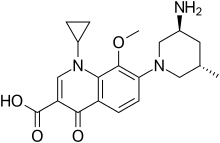Nemonoxacin
Nemonoxacin is a non-fluorinated quinolone antibiotic undergoing clinical trials.[1] It has the same mechanism of action as fluouroquinolones; it inhibits DNA gyrase, preventing DNA synthesis, gene duplication, and cell division. At the end of 2016, it had reached market in Taiwan, Russia, the Commonwealth Independent States, Turkey, mainland China,[2] and Latin America[3] under the brand name Taigexyn. Nemonoxacin has completed phase 2 trials in the USA and has moved on to phase 3 trials.[4] The U.S. Food and Drug Administration (FDA) has granted nemonoxacin qualified infectious disease product (QIDP) and fast track designations for community-acquired bacterial pneumonia (CAP) and acute bacterial skin and skin-structure infections (ABSSSI).[5]
 | |
| Names | |
|---|---|
| IUPAC name
7-[(3S,5S)-3-Amino-5-methyl-1-piperidinyl]-1-cyclopropyl-8-methoxy-4-oxo-1,4-dihydro-3-quinolinecarboxylic acid | |
| Identifiers | |
3D model (JSmol) |
|
| ChemSpider | |
PubChem CID |
|
InChI
| |
SMILES
| |
| Properties | |
Chemical formula |
C20H25N3O4 |
| Molar mass | 371.437 g·mol−1 |
| Pharmacology | |
| J01MB08 (WHO) | |
Except where otherwise noted, data are given for materials in their standard state (at 25 °C [77 °F], 100 kPa). | |
| Infobox references | |
Nemonoxacin has a broad spectrum of activity against Gram-positive, Gram-negative, and atypical pathogens, including activity against methicillin-resistant Staphylococcus aureus (MRSA) (MIC90 1 g/ml) and vancomycin-resistant pathogens.[6][7] However, it was less active against Gram-negative pathogens such as Escherichia coli, Proteus mirabilis, and Pseudomonas aeruginosa, with MIC90 values of 32, 16, and 32 g/ml, respectively.[8] The new drug also is effective against C.difficile isolates that are resistant to other quinolones,[9] and is more potent than levofloxacin or moxifloxacin.[10]
References
- Guo, B; Wu, X; Zhang, Y; Shi, Y; Yu, J; Cao, G; Zhang, J (2012). "Safety and clinical pharmacokinetics of nemonoxacin, a novel non-fluorinated quinolone, in healthy Chinese volunteers following single and multiple oral doses". Clinical Drug Investigation. 32 (7): 475–86. doi:10.2165/11632780-000000000-00000. PMID 22650326.
- "TaiGen releases Taigexyn (nemonoxacin) capsules in Taiwan". 16 December 2015.
- Biotechnology, TaiGen. "TaiGen Biotechnology Out-Licenses Taigexyn® (Nemonoxacin) to Productos Científicos for the Latin American Market".
- "A Phase III Study to Evaluate the Efficacy and Safety of Intravenous Infusion of Nemonoxacin in Treating CAP - Full Text View - ClinicalTrials.gov".
- "FDA grants QIDP and Fast Track designations to TaiGen's nemonoxacin". 23 December 2013.
- Lauderdale TL, Shiau YR, Lai JF, Chen HC, King CH (2010). "Comparative in vitro activities of nemonoxacin (TG-873870), a novel nonfluorinated quinolone, and other quinolones against clinical isolates". Antimicrob. Agents Chemother. 54: 1338–1342. doi:10.1128/aac.01197-09. PMC 2825994.
- Adam HJ, Laing NM, King CR, Lulashnyk B, Hoban DJ, Zhanel GG (2009). "In vitro activity of nemonoxacin, a novel nonfluorinated quinolone, against 2,440 clinical isolates". Antimicrob. Agents Chemother. 53: 4915–4920. doi:10.1128/aac.00078-09. PMC 2772340.
- van Rensburg DJ, Perng RP, Mitha IH, Bester AJ, Kasumba J, Wu RG, Ho ML, Chang LW, Chung DT, Chang YT, King CH, Hsu MC (2010). "Efficacy and safety of nemonoxacin versus levofloxacin for community-acquired pneumonia". Antimicrob. Agents Chemother. 54: 4098–4106. doi:10.1128/aac.00295-10. PMC 2944601.
- Liao, C. H.; Ko, W. C.; Lu, J. J.; Hsueh, P. R. (2012). "Characterizations of Clinical Isolates of Clostridium difficile by Toxin Genotypes and by Susceptibility to 12 Antimicrobial Agents, Including Fidaxomicin (OPT-80) and Rifaximin: A Multicenter Study in Taiwan". Antimicrobial Agents and Chemotherapy. 56 (7): 3943–3949. doi:10.1128/AAC.00191-12. PMC 3393409. PMID 22508299.
- Liang, W; Chen, Y. C.; Cao, Y. R.; Liu, X. F.; Huang, J; Hu, J. L.; Zhao, M; Guo, Q. L.; Zhang, S. J.; Wu, X. J.; Zhu, D. M.; Zhang, Y. Y.; Zhang, J (2013). "Pharmacokinetics and Pharmacodynamics of Nemonoxacin against Streptococcus pneumoniae in an in Vitro Infection Model". Antimicrobial Agents and Chemotherapy. 57 (7): 2942–2947. doi:10.1128/AAC.01098-12. PMC 3697386. PMID 23587953.